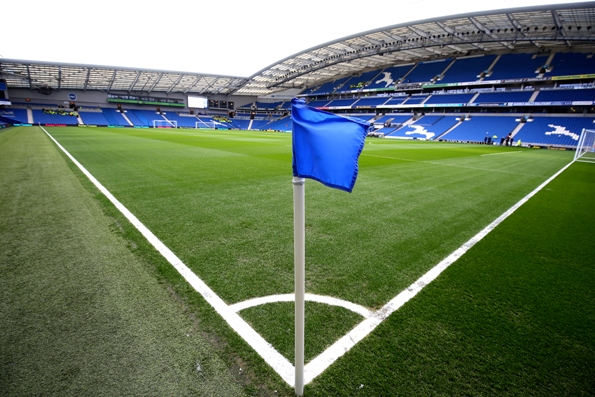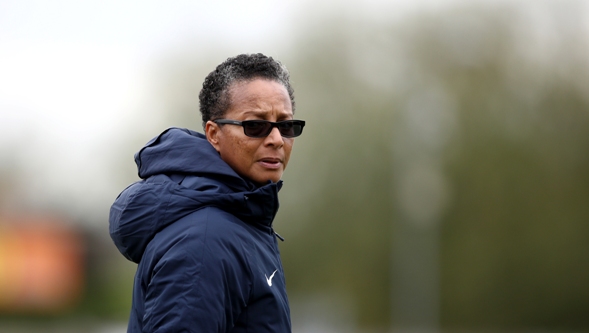Brighton & Hove Albion’s non-executive director Michelle Walder discusses women in the boardroom, diversity in football, the women’s team and online trolling.
Michelle Walder joined Brighton & Hove Albion’s board of directors in the summer of 2016, and since when she has witnessed at close quarters, the astronomical rise of the club.
Her expertise lies in strategic HR policy matters and senior level people development. Her ‘day job’ is CEO and co-founder of leadership and business consultancy TXG.
In her role at the club, which she describes as a ‘labour of love’, she attends the club’s board meetings and is chair of the club’s new women’s football subsidiary. She also chairs the club’s HR committee, which, among other matters, considers policy and remuneration.
Michelle, 44, explains: “I met (club owner) Tony (Bloom) eight years ago through work. I got involved more and more, before the club decided to appoint an additional non-executive director to its board, and Tony approached me.”
Now in her third season with the Seagulls, her time there has coincided with a meteoric rise for the club which she acknowledged, stating: “I am so glad I got to see the Championship promotion season, as well as our first season and a half in the Premier League. It has been good context.
“The progress has been immense with the men and women. Two years ago the women’s team had just been promoted into WSL2. Their progress since then has been huge. We are now in the top flight and we have gone fully professional.”
 |
So how does Michelle see her role and what ‘value-added’ does she bring with her?
“I have expertise around HR, people and leadership. I see myself as support for others to deliver what they need. I am reasonably hands-on, I like to feel I am involved and in touch with all areas of the club.
“The women’s side of things is super exciting. That requires my energy to build and to advocate it and ensure everybody has bought into it.
“One of the challenges for football – as with other industries – is to understand the decisions we are making and what are we trying to be. It is important to ensure everyone understands why we do something and why it is important.
“I bring know-how from other sectors and businesses. Football is football of course, but we have offices full of people doing other things. We have marketing, comms, legal and maintenance – many different areas. It is incredibly diverse in terms of the range of jobs.
“That is an interesting thing to get your head around. That is what Tony values. He would say getting perspective and an understanding from a fresh pair of eyes can give additional perspective, which is extremely useful to the board. To look at something and ask why things are done the way they are, can be extremely advantageous.”
Developing the talent pool is key to the club’s overall success, not least in the women’s team and the hiring of former England women’s manager Hope Powell (below) was a massive statement of intent for the club.
 |
“It tells people we are working at a very high level and taking the women’s game seriously. But equally, Amy (Merricks) her assistant, has come up through the ranks and is an example to everyone of us as a club that develops talent. Amy has proved you can rise up through the club.”
The club’s chief executive, Paul Barber, has openly admitted investing a seven-figure sum to support a professional women’s team and doesn’t end there, either, with the club investigating plans for separate facilities for its women’s and girls’ football operations.
“The infrastructure is the real investment we need to make if we want to play at this level on a long-term basis. The key is to stay in the top league – as is the case in the men’s team. We’ll take it from there,” she adds.
The club is also set to be awarded a further boost as part of The FA’s bid to host the UEFA Women’s Euro finals in 2021, which will see the Amex as one of the host venues for the tournament.
“It will be great, really exciting, and we are delighted to be part of the bid. It will be such a positive for women’s football and there promises to be great matches that will bring new people into the city. It will be nice to be by the sea in July, playing and watching football.”
But with the number of women still relatively small at board level in football, has Michelle observed tangible change within the game during the last couple of years?
“What I have been given is a voice within the leadership of the club. There aren’t many women working at board level within clubs, but there are some, and there will be more. As the profile of boards change, it will change perceptions and give people different views on football.
“If women are involved and doing well – that sends a different message to young women that football can be a career for them. If you need meaning in your job, work for a football club – you see the output of your efforts every week. It is fun and not scary.
“I am still sometimes asked whose wife I am. That is numbers to me. Once you have 20%-30% women in these environments, those questions will stop.”
However, the recent grotesque abuse of England player Karen Carney, significantly by online trolls via social media, was extremely unsavoury and demonstrates how there is plenty more work to do on gender equality in football, as in wider society.
“What happened to Karen was disgusting,” reinforcing her position in the issue. “It is appalling and baffling to me. But I do think that the people who have spoken out and said it is unacceptable, from governing bodies, to other players and male executives, has in some way felt quite positive.
“One of the things that has always been challenging for women is when there is silence around something that is going on for them. That feels like it may be changing.
“It is powerful when men speak out; as women are reassured that men care about these issues too. But it is all about action. Penalties for this behaviour should be high. People should be blocked and banned from social media for threatening behaviour.”
Michelle is keen to see more equality across all levels within football and she is hopeful that this will happen sooner rather than later.
Words: Alex Miller
Images: PA Images



